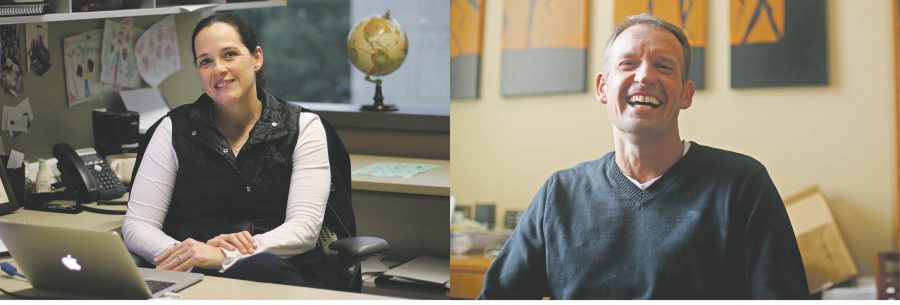Editor’s Note: This article appears in a package focused on LGBT issues on campus. Click here to read about the Delta Lambda Phi fraternity and issues trangender students face.
On the first day of class, journalism senior lecturer Kate Dawson comes out to her students, usually couching the matter-of-fact introduction of her wife and kids with a joke about their early 8 p.m. bedtimes.
“It would be strange for me to not say,” Dawson said. “It’s almost like avoiding that I went to Columbia for graduate school, or that I grew up here. It is part of my narrative, and it’s not a part that is ever going to change.”
Dawson is one of many LGBT professors at UT who find themselves in an entirely new position today than they were in 2014. Same-sex marriage is legal and, since July, UT grants comprehensive health insurance to the spouses of LGBT faculty and staff. While some professors are content with the University’s current climate, others continue to see room for improvement.
Dawson said she has never had a problem being a lesbian faculty member. She is open about her sexual orientation and wants her students to know her interests and think of her as more than just a person who lectures at them every week. By talking about her family and hobbies, she said she brings students into her world and becomes comfortable in theirs. She said students often fill her office hours to discuss personal issues, from their mental health to sexuality.
Government professor Sean Theriault said he no longer has any issues with the University since they started granting comprehensive health insurance.
After 14 years of teaching, Theriault said he has adjusted the way he comes out to his students as society has become more accepting of the gay community. At the beginning of his career, he said he was much more explicit when coming out to the classroom because he wanted his students to have a face to put to the gay rights movement.
“I think about these kids who are 17, and they leave their little town in Texas, and the only things they have ever heard about gay people are [from] Texas politicians and the preachers from their small little hometowns,” Theriault said. “I wanted to be a counterexample to them.”
Today, Theriault said he assumes most of his students are accepting and is less concerned with coming out so explicitly. He said he is open with his students about all aspects of his life, from his partner to his half marathon schedule. He said he thinks he makes some students uncomfortable, which they express through low evaluations, but he has never had an issue with a colleague in his department.
“Plenty of people I have taught with are conservative, but none of them have ever expressed any kind of negative views,” Theriault said. “I have always felt like they were my comrades-in-arms.”
English professor Lisa Moore said she sees ways the University can improve conditions for LGBT professors. She said in an email that she believes UT administration, students and alumni need to lobby against anti-gay bills that continue to enter the Texas Legislature.
“That hurts, and it justifies the very real violence and discrimination we still face,” Moore said.
Before July 1, the state denied UT professors comprehensive health insurance for their domestic partners because it did not recognize domestic partnerships, marriage or civil unions between individuals of the same gender. Five days after the Supreme Court legalized same-sex marriage, UT began allowing LGBT benefits-eligible employees to enroll in the same plan granted to eligible straight employees.
This year also marks the first time the University has granted LGBT faculty and staff bereavement leave, sick leave or parental leave.
The Pride & Equity Faculty Staff Association works in conjunction with other organizations to achieve equal benefits for LGBT faculty and staff. As of this summer, they have met all of their goals and are figuring out what faculty and staff want from them in the future, such as more job security and volunteer and social opportunities.
“We are actually in a transformation,” said Beth Chichester, chair of PEFSA’s executive committee. “We are actually in a flux right now as we look to the future and start charting that course.”





















